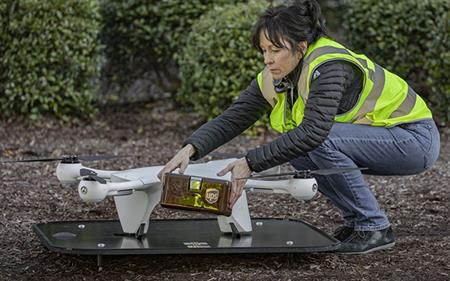UC San Diego Health is launching a pilot project to test the use of unmanned aerial vehicles to transport medical samples, supplies and documents in February 2020. San Diego participates the Federal Aviation Administration’s (FAA) Unmanned Aircraft System (UAS) Integration Pilot Program to evaluate operational concepts to enable safe integration of drones into civil airspace. UC San Diego is approved by the FAA to test the use of drones in transporting lab specimens and pharmaceuticals throughout its health system. The test flights will take place between Jacobs Medical Center and Moores Cancer Center and the Center for Advanced Laboratory Medicine (CALM), speeding delivery of services and patient care currently managed through ground transport.
According to a press release issued by UC San Diego Health:
The programme is a collaboration with UPS, which received in September 2019 the Federal Aviation Administration’s (FAA) Part 135 Standard certification and authorization to use unmanned aircraft systems for a drone delivery programme, and Matternet, a California-based drone systems developer for health care institutions. This latest effort builds upon the UPS Healthcare and Matternet drone project already taking place at WakeMed Health and hospitals in Raleigh, N.C.
The latest project calls for medical professionals at Jacobs Medical Center, located on the east health campus of UC San Diego in La Jolla, to pack payloads, such as blood samples or documents, into a secure container that attaches to one of Matternet’s M2 rechargeable battery-powered drones.
The drones will follow predetermined, low-risk flight paths, initially between Jacobs Medical Center and special landing sites at Moores Cancer Center, located less than a mile away and within visual line of sight under the FAA’s Part 107 rules, and then subsequently at CALM, which is near the Jacobs Medical Center. The flights will take only minutes to complete and will be monitored by remote operators. The drones will carry no cameras.
“Currently, medical samples that must be transported between health care sites are carried by courier cars, which are naturally subject to the variabilities of traffic and other ground issues,” said Matthew Jenusaitis, chief administrative officer for innovation and transformation at UC San Diego Health. “With drones, we want to demonstrate proof-of-concept for getting vital samples where they need to be for testing or assessment more quickly and simply.”
For more information visit:




